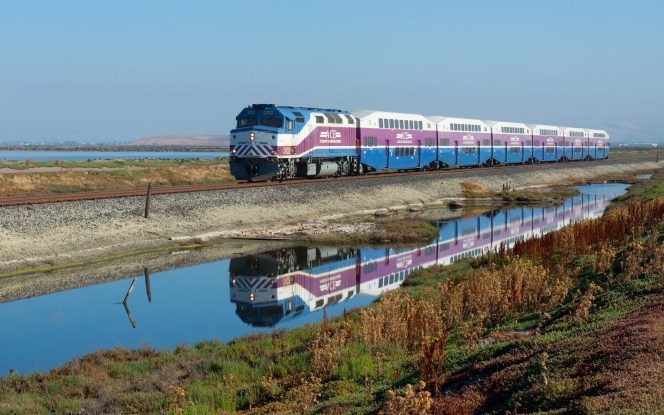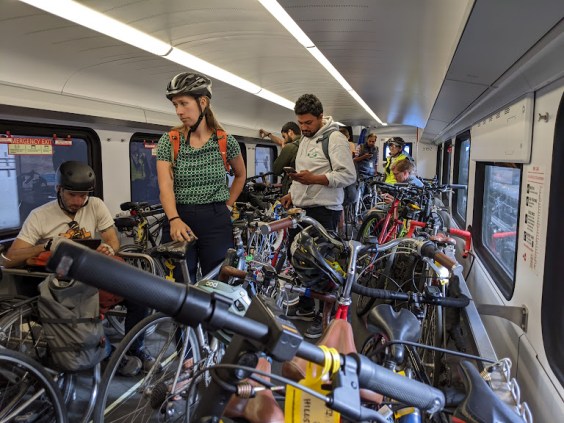Note: GJEL Accident Attorneys regularly sponsors coverage on Streetsblog San Francisco and Streetsblog California. Unless noted in the story, GJEL Accident Attorneys is not consulted for the content or editorial direction of the sponsored content.
There are roughly 5,000 cars not on the freeways during the weekday rush hour and not adding to the traffic congestion between the Central Valley and San Jose, thanks to the Altamont Corridor Express rail service, seen in the lead image.
Late last week, the California State Transportation Agency (CalSTA) awarded an additional $12.3 million dollars in S.B. 1 funding through the State Rail Assistance (SRA) program. The San Joaquin Regional Rail Commission (SJRRC) and San Joaquin Joint Powers Authority (SJJPA) will use the money for ACE and for Amtrak's San Joaquins, which connect the Central Valley with Oakland and Sacramento.
From the press release:
For ACE service, the current funding award includes $3.4 million for extending the Fremont station platform to accommodate longer trains, and $500,000 for the Lyoth rail connection in Tracy. This junction currently requires ACE trains to slow down through the area due to the manual safety system for the short-haul freight line connecting to the mainline. The upgrade to an electronic safety system will allow for increased ACE train speeds through the junction.
Those are incremental improvements that, obviously, won't solve the state's transportation problems on their own. But ACE is just one of hundreds of big and small projects that depend on S.B.1 funding, which Prop. 6 would cancel out if it is approved tomorrow.
"S.B. 1 is already contributing essential funding to capacity expansions and reliability improvements for Caltrain, BART, Muni, AC Transit, and more," explained the San Francisco Transit Riders' Adina Levin in an email to Streetsblog.
"If Prop. 6 passes it will set our movement back tremendously, possibly by many decades! Yes, we would we lose the direct annual funding -- $100 million for active transportation, $750 million for transit and $1.5 billion (with a B) for local road maintenance that is fixing our cracked roads and bringing us so many complete streets with it," wrote Stuart Cohen, Executive Director of TransForm. "But we would also have a MUCH harder time winning these funds again."
That's because Prop 6, in addition to cancelling the S.B. 1 gas-tax adjustment, would require any new state transportation taxes to be passed by voters.
Streetsblog California did a breakdown some of the expenditures from S.B. 1 and what would happen if it were repealed. Streetsblog, via SPUR, described the long-term implications to the state of Prop. 6. The irony is that motorists, more than almost anyone, will be impacted by roads that will continue to deteriorate, since the vast majority of S.B. 1 funds go to state highway maintenance.
So why are some Republicans pushing so hard on Prop. 6 if it can be so damaging, even to the motorists they claim to be protecting? It's because the gas tax has become mired in politics and today's scorched-earth partisan power-plays.
All of which means the choice on Prop. 6, actually, is pretty simple.
"If Prop 6 passes," wrote Livable City's Tom Radulovich in an email to Streetsblog, "San Francisco, the Bay Area, and California will become less mobile, less safe, less equitable, and less livable. Public transit will get more crowded, less reliable, and less safe. Our roads and bridges will deteriorate faster, and critical safety and accessibility projects won’t get built."
Or, as SPUR's Ratna Amin put it: "Transportation costs money and leaders didn’t pay the bills. With S.B. 1 we have money and now people want to take it away, set us back a generation, and make California an infrastructure backwater."






